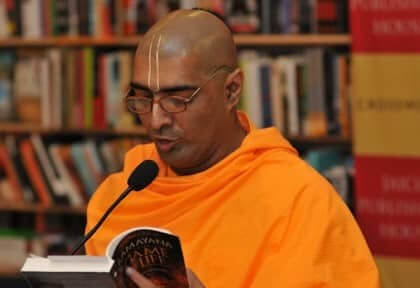According to Shubha Vilas Das, life lessons from the original literatures could help us lead our modern lives better
Shubha Vilas Das took on a monumental task of writing a book on the Ramayana in 2013 – a book that would bring the epic out of the closet and reveal to the world the depth of learning hidden in it. He embarked on an ambitious project of writing a 6-volume series titled Ramayana – The Game of Life. The first three volumes, Rise of the Sun Prince (Book 1) and Shattered Dreams (Book 2) and Stolen Hope (Book 3) from his book series have become national best sellers, and he has now completed the fourth volume in the series. He was a guest at the 2017 Jaipur Literary Festival, and he is now a much sought after motivational speaker and counsellor.

I caught up with the author recently when he spoke at ISKCON Melbourne and the Vedic Society of Victoria.
Shubha Vilas’ three volumes in the Ramayana series vividly bring alive the epic which, the author felt, had been largely ignored as philosophical literature.
“I decided to write the Ramayana from a new, modern perspective, yet remaining true to its universal and perennial messages, because I saw that either there were versions that were written from a traditional perspective, or those that were being reinterpreted and rehashed for modern times by ignoring the spirit in which it was originally composed,” he told me.
He embarked on an extensive research of original literatures like Valmiki Ramayana in Sanskrit, Kamba Ramayana, the oldest Ramayana version in a vernacular language; and Tulsidas’ immortal Ramcharitamanas in Avadhi.
“For me this epic was full of life lessons which can be profitably used to inform our lives in the twenty first century.”
The result is a wonderful retelling of this popular epic which provides deep insights on contemporary subjects such as how human relationships work or why they fail, how leaders can maximize their potential, and how the ancient epic can provide a moral compass in a rapidly changing world. These books interpret stories from the Ramayana and distil lessons from them to help us better understand and live meaningful lives.
Shubha Vilas Das’ fourth book titled Open-Eyed Meditations was launched in Mumbai in September 2016. It is a beautiful compilation of thoughts where each meditation takes on a journey to the past to heal a problem in the present. He helps people practise and master the art of meditation with eyes wide open as he believes the keen observation of the world around us (rather than shutting it out), is an equally legitimate way to enlightenment. He offers valuable nuggets of wisdom and action point resources to deal with every modern dilemma.
Given his love for books, Shubha Vilas Das set up Tulsi Books Publications, a publishing house that promotes books that encourage spiritual thinking and reasoning. He was not always an author: he began his career as an engineer with the Tata Group and later moved to an international law firm in Bangalore. After this stint in the corporate world, he joined the International Society for Krishna Consciousness (ISKCON) and then decided to serve society in as many ways as he could. He became a monk and chose to be a spiritual seeker and preacher. His keen interest in finding a goal for life led him to channel his energies into deep studies and interpretations of Vedic Scriptures. He is now President of ISKCON Goa, and spends a great deal of time addressing people from all walks of life through thought-provoking seminars. He has become a much sought-after motivational speaker. (For a sample, the reader would be able to find several wonderful talks on YouTube).
Shubha Vilas Das gave a talk at the Vedic Society of Victoria on “Ancient wisdom for modern life” and at ISKCON he spoke about how to “Stop worrying and start living”. As the topics suggest, Vilas Das’s forte is to find answers to problems in 21st century life, by looking at our ancient – yet universal and perennial – wisdoms from our traditions, especially the Ramayana and the Mahabharata.
Shubha Vilas Das’ Ramayana Volume 4 is with the publishers. He is now working on some unusual and unheard of stories from the Puranas, in a book he is going to call Mystical Tales for a Magical Life. He is also working on a book for the youth on how to address and handle certain emotions in our lives like envy, insecurity, etc. He is simultaneously working on Ramayana Part 5, and a book on the Bhagawad Gita – which will succinctly summarise the message of the Gita.
All his books are available on Amazon or through ISKCON.
Some nuggets from Shubha Vilas Das’ talks
“The Mahabharata demonstrates how a person’s true greatness can be seen in the way they handle provocation. It is always easy to be great when things are going well. However, when provoked, we should become like the tortoise, that is, withdraw and think. In the Mahabharata, Karna’s life teaches us this, that happiness comes from within us, and that waiting for others’ approval and validation makes us deeply unhappy.”
“One of the ways in which we can improve our self-image is by contributing to the world; being consumeristic is being like Ashwattama, who tried getting gratification from possessions and owning things. Arjuna, on the other hand, tried to get the most from what he had.”




